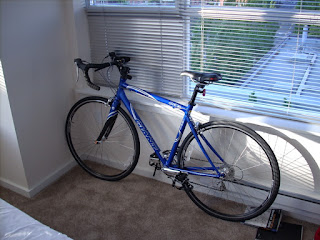How healthy is it, in the long run, to bike places instead of driving?
I began biking regularly in the latter half of 2006. How much have these past six years of biking helped my life?
For all this time, I’ve averaged about 20 miles a week, the typical length of my commute to school or work. Many weeks of inactivity have been roughly balanced out by a lot weeks of 70 or 100 miles.
So I’ve biked about 20 * 50 * 6 = 6000 miles in six years. That’s just three miles a day, a pittance, but sustained over a long time.
Using this calorie counter for bikes, with my average weight during this time (about 250 lbs), 10 mph average speed, no elevation change, 80% flat ground, 10% uphill, 10% downhill (conservative estimates for sure!), and 6000 miles, I get 475,305 calories.
At 3500 calories a pound, that’s 135 pounds that I could have otherwise gained.
I weight 273 lbs. Even at six feet tall, that makes me a very large man! If I had gained all those calories, I would weigh 408 lbs. At that size, my risk factors for diabetes and heart disease would be huge.

This isn’t even considering the downstream effects (more muscle, thus even more automatic weight loss) of having biked those miles, nor the roughly $600 in gasoline I would have otherwise spent*, nor the general therapeutic benefits to my happiness.
My bicycles have saved my life. We’re not done yet (273 lbs is a long, long way off from the good), but I’m glad to know I got something done.

*Okay, maybe more like $400, taking out a lot of the fun rides.




